Doctor (Dr.-Ing.) in Media
Bauhaus-Universität Weimar
|

|



| |
|
|
Project Title
|
Cultural Heritage on Mobile Devices: Building guidelines for UNESCO world heritage sites' apps.
|
|
Supervisors
|
Jun.-Prof. Dr. Florian Echtler / Mobile Media Group
(former) Prof. Dr. Jens Geelhaar / Interface Design
|
|
About
|
This research project was sponsored by CNPq in partnership with the DAAD (Deutscher
Akademischer Austauschdienst).
It has being developed at the Bauhaus-Universty Weimar,
starting in the Chair of Interface Design, Faculty of Art & Design and Faculty of Media, moving to the Mobile Media Group.
One of the outcomes from this research is to create guidelines for
the use of mobile apps applied on cultural heritage sites from UNESCO,
taking Weimar (Classical Weimar,
and Bauhaus sites)
as practical example. This research deals with User Interface
guidelines for different target groups, according with their age, interests and needs.
|
|
Thesis Download
|
(360 pages, in PDF format)
 Thesis_JoatanPreisDutra.pdf
Thesis_JoatanPreisDutra.pdf
|
| |
|
|
DOI
|
https://doi.org/10.25643/bauhaus-universitaet.4531
|
|
URN
|
https://nbn-resolving.org/urn:nbn:de:gbv:wim2-20211129-45319
|
| |
|
 Along with my doctoral research activities at Bauhaus-University Weimar,
I developed the content and concept for several modules for Master Students from different programmes
from the Faculty of Art & Design and Faculty of Media, under the
Chair of Usability Design such as:
Along with my doctoral research activities at Bauhaus-University Weimar,
I developed the content and concept for several modules for Master Students from different programmes
from the Faculty of Art & Design and Faculty of Media, under the
Chair of Usability Design such as:
- Media Art and Design
- Media Architecture
- Media Management
- Computer Sciences
I believe it is important to prepare the students for job scenarios that do not exist yet,
especially in creative media, by giving a solid basis for media design and usability,
dealing with different media and demands. These teaching activities allied the theoretical research
content and its practical appliance.
The offered modules covered digital and mobile media concepts, how media are present in public spaces,
allied with how to design mobile apps, how mobile applications can be used for local cultural promotion,
along with the definitions of what is media, what is digital, UX and interface design considerations,
plus academic writing.
These modules also had a practical part where students developed a conceptual prototype/mock-up for an app with
cultural and location-based information, applying the Interface Guidelines of the chosen mobile platforms.
The students were involved in theoretical and practical activities, contributing with ideas and academic writing.
The offered modules have a similar structure: preparatory lectures for the development of practical activities,
direct guidance of students and presentations of the results. In the proposed structure of the classes,
students must perform a market evaluation and analysis, related to the module activities.
Students then must create an application with the same purpose and make a prototype.
Finally, writing a short scientific paper related to the themes developed in class.
Despite the similarities between the created modules, they have different
focuses and differences. Bellow there are a short explanation
about each offered course, its URLs.
The complete list of given modules are listed below, but also available at
http://www.uni-weimar.de/medien/wiki/Category:Joatan_Preis_Dutra .
| |
|
|
Period
|
Winter Semester 2015-2016
|
|
Title
|
Mobile Media Design
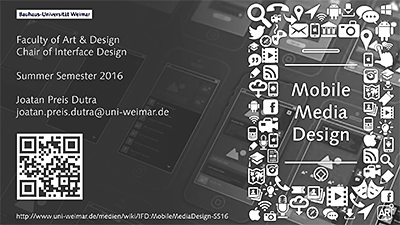
|
|
Abstract
|
The main focus of this module is how to design for mobile screens, icons and what are the interface differences between mobile platforms and how it affects the design choices.
In this course, a practical prototype app is expected to be developed, using cities with World Heritage Sites from UNESCO.
A context-aware mobile app could help visitors to navigate through the city, transforming the urban scenario into an open-air museum.
This module allies theoretical and practical content for mobile media design, using touristic visitors' data as user-case scenario.
|
|
URL
|
http://www.uni-weimar.de/medien/wiki/IFD:MobileMediaDesign-SS16
|
|
Students' Prototype Preview
|
http://www.uni-weimar.de/medien/wiki/IFD:MobileMediaDesign-SS16#Project_Presentation
|
Module evaluation from students
|
Module evaluation:
SS16 Mobile Media Design
|
 |
| |
|
|
Period
|
Winter Semester 2015-2016
|
|
Title
|
Mobile Media and Cultural Heritage
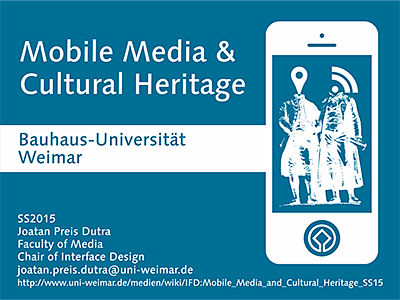
|
|
Abstract
|
The main focus of this module is the relation between mobile media and cultural heritage, with emphasis on the official UNESCO's World Heritage Sites in Weimar.
Mostly, the already developed applications and games using mobile devices to interact with urban spaces are dealing with tangible elements of the culture.
A mobile App could also work for intangible and tangible elements, in order to enhance the knowledge regarding it, with different solutions applied for different group ages (adults and teenagers).
This module is an invitation to theoretical and practical perspectives to observe mobile media and context-aware scenarios, addressed for cultural purposes. It is a methodological and creative approach to analyze the mobile media role for cultural heritage.
|
|
URL
|
http://www.uni-weimar.de/medien/wiki/IFD:Mobile_Media_and_Cultural_Heritage_WS15
|
|
Students' Prototype Preview
|
http://www.uni-weimar.de/medien/wiki/IFD:Mobile_Media_and_Cultural_Heritage_WS15#Presentations
|
Module evaluation from students
|
Module evaluation:
WS15-16 Mobile Media and Cultural Heritage
|
 |
| |
|
|
Period
|
Winter Semester 2013-2014
|
|
Title
|
Mobile Media and Urban Spaces
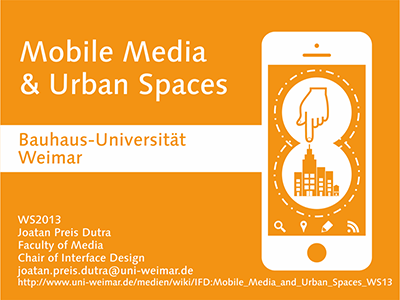
|
|
Abstract
|
The focus of this module are mobile applications that deal with cultural heritage, especially in Weimar. As activities, students had to present an evaluation of a mobile application on cultural heritage in Germany, based on UNESCO's official website list.
If the technology can bring the world in a small scale of a mobile screen by enhancing the museums and galleries possibilities, the portable technology can also add elements to the real world, changing the perception of urban spaces. There are no more limitations about space, neither about the opening hours to provide to the visitors a complete and empowered cultural experience. Mostly, the already developed applications and games using mobile devices to interact with urban spaces are dealing with tangible elements of the culture. A mobile app could also work for intangible and tangible elements, in order to enhance the knowledge regarding it.
From the practical perspective, the students had to develop a prototype that offers content on one of the UNESCO's sites in Weimar, within the concepts of tangible and intangible cultural heritage. Here the developed mobile application options varied from tour guide, such as games, or on a specific place in particular, for example the house where the famous German writer Goethe lived in Weimar.
|
|
Module URL
|
http://www.uni-weimar.de/medien/wiki/IFD:Mobile_Media_and_Urban_Spaces_WS13
|
|
Students' Prototype Preview
|
http://www.uni-weimar.de/medien/wiki/IFD:Mobile_Media_and_Urban_Spaces_WS13/presentations#Final_Presentation_-_January_2014
|
Module evaluation from students
|
Module evaluation:
WS13-14 Mobile Media and Urban Spaces
|
 |
| |
|
|
Period
|
Summer Semester 2013
|
|
Title
|
Collaborative Mobile Media
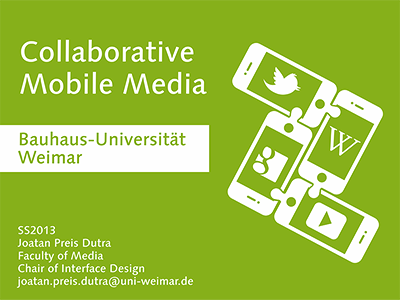
|
|
Abstract
|
The main focus of this module was the discussion of collaborative aspects that may exist through the use of applications and how it is possible to collect and use published information on the internet for cultural preservation purposes.
In this class was discussed which technologies can be traced as common sense on the already adopted applications and which other resources are available to deal with the user experience on the cultural heritage information, and how the use of collaborative technologies can magnify the content production, preserving the intangible elements of culture, from the user perspective.
This class had a theoretical overview about mobile media and a practical part where the students develop a mock-up model for a collaborative mobile app, working as a conceptual model of cultural patterns' aggregator, where it will be possible to learn more about this topic and having the possibility to collaborate with their own ideas.
|
|
Module URL
|
http://www.uni-weimar.de/medien/wiki/IFD:Collaborative_Mobile_Media_SS13
|
|
Students' Prototype Preview
|
http://www.uni-weimar.de/medien/wiki/IFD:Collaborative_Mobile_Media_SS13/presentations#.282nd_.26.29_3rd_Assignments_-_App_Prototype_Presentations
|
Module evaluation from students
|
Module evaluation:
SS13 Collaborative Mobile Media
|
 |
| |
|
|
Period
|
Winter Semester 2012
|
|
Title
|
Mobile Culture and Urban Spaces
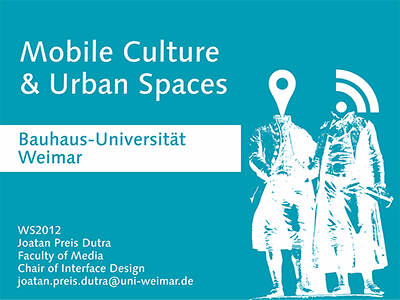
|
|
Abstract
|
The main focus of this module was the discussion about how the digital media are present in the urban spaces, and how it can be related to cultural aspects, through mobile devices gadgets. It is a methodological and creative approach to analyze the mobile culture role in the urban spaces, under a theoretical and interpretative approach.
Nowadays, technology is present on most part of people's daily life. Digital equipment belongs to the people's routine and they are increasingly amalgamated to the daily activities and are integrated in a way such that perceptions of technology as a special feature are, somehow, decreasing.
Another phenomenon that occurs at the same time came from the permanent connectivity (an ubiquitous scenario) reinforced by the mobile devices, specifically the smartphones. The everyday new possibilities through them can configure an important role in the society, especially for cultural purposes.
The students, among several activities, had to develop a mobile app mock-up for cultural purposes, interacting with the urban scenario. The developed apps ranged fields from scavenger hunter games to cultural urban guides placed in Weimar.
|
|
Module URL
|
http://www.uni-weimar.de/medien/wiki/IFD:Mobile_Culture_and_Urban_Spaces
|
|
Students' Prototype Preview
|
http://www.uni-weimar.de/medien/wiki/IFD:Mobile_Culture_and_Urban_Spaces/presentations#2nd_Assignment_-_Prototype_Presentations
|
Module evaluation from students
|
Module evaluation:
WS12-13 Mobile Culture and Urban Spaces
|
|
 Contact
Contact














